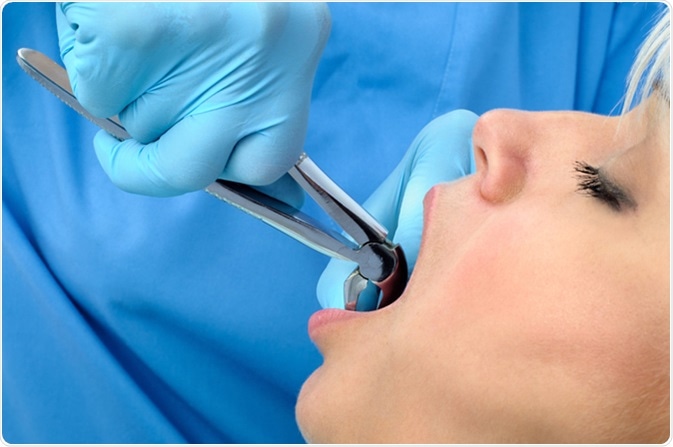Most patients prefer to avoid having a tooth removed, and dentists usually recommend saving the biological tooth if it is possible. However, dental extraction or tooth removal may be the option in some cases. There are several possible reasons for dental extraction, such as severe tooth damage, orthodontic treatment, and abnormal tooth development. Each of these is discussed in more detail below.

Dental extraction. Image Credit: Serghei Starus / Shutterstock
Severe Tooth Damage from Decay or Trauma
A tooth that has been subject to severe decay or infection (e.g. an abscessed tooth) may need to be removed. If it is diagnosed in the early stages, it is often possible to preserve the biological tooth of the patient. However, when the tooth has already undergone significant decay it may not be possible to salvage the tooth. In this situation, removal may be the only option to preserve the adjacent teeth from the same issues.
Significant injury or trauma to the tooth may also be a reason for dental extraction. If the tooth is severely chipped, cracked or broken, it may cause damage to the gums and other teeth in the month. As a result, removal of the tooth may be indicated.
A conservative approach to restoring the natural tooth with a crown or filling is usually preferred, but extraction is an option in severe cases.
Some patients opt to get a dental implant to replace a damaged tooth rather than use restorative methods such as a dental crown. In this case, the original tooth must be completely removed by way of dental extraction before the dental implant can be placed into the jaw.
Dental extraction can often be a more affordable option for the restoration of a severely damaged tooth, particularly over the long term, which is also a considerable factor for some patients.
Orthodontics and Tooth Alignment
Some individuals have a crowded jawline that does not offer enough room to hold all the teeth in the correct position before commencing orthodontic treatment, such as dental braces.
There are two possible solutions to this problem: to expand the jawbone to allow more space for the teeth to be aligned as needed, or to remove some of the teeth so that the remaining teeth can fit correctly. Therefore, incorrect alignment of the teeth due to a small jawbone may be a reason for a dental extraction to occur. Teeth that are too large for the mouth may also need to be removed to prevent them causing problems to other teeth.
Dental extraction should occur before the orthodontic treatment begins and the braces are placed. In most cases, the teeth are removed symmetrically to maintain the balance of the bite.
Abnormal Development of Teeth
Dental extraction is also recommended when a tooth does not erupt through the gums or becomes impacted. This often occurs with third molars, commonly known as wisdom teeth.
Teeth that have not erupted or are impacted are more likely to become infected or be associated with other complications, such as infection, pain, and inflammation. It is for these reasons that dental extraction of the teeth is often carried out for teeth with abnormal development.
Dental extraction may also be recommended for children with primary teeth that have not fallen out at the appropriate time. This is usually recommended only several years after the expected time of natural loss to encourage the permanent adult teeth to erupt in the correct position, thus reducing the need for orthodontic treatment later on.
References
- https://ntfos.org/tooth-extracted/
- https://www.ncbi.nlm.nih.gov/pubmed/9175351
- https://www.ncbi.nlm.nih.gov/pubmed/11340717
- https://www.allarounddentalcare.com/blog/reasons-for-tooth-extraction/
- https://www.karger.com/Article/FullText/345979
Further Reading
Last Updated: Feb 26, 2019